- Home
- Farley Mowat
The Curse of the Viking Grave Page 3
The Curse of the Viking Grave Read online
Page 3
Awasin was resigned to her presence almost from the first. He knew his sister, and he had no intention of wasting time and energy pitting his will against hers. Besides, he recognized her value and was secretly delighted to have the benefits of her presence.
One day about a week after their return Awasin and Jamie were cutting wood together and talking about the fix Angus was in, and of what they could do about it.
“Peetyuk is much better now,” Awasin said. “With Angeline to keep the cabin and look after him, perhaps we should start trapping again. Long-hair fur is still prime and the time is coming for the muskrat and beaver. Soon my father will go south to the trading post to clear his winter debt and to outfit for the spring hunt. We can send our furs with him and he can buy the things we will need when we go north to the Barrenlands.”
Jamie brightened visibly at this suggestion. He had been doing much brooding about his problems, and the worry of being responsible for finding money to free his uncle from the degradation of being treated as a welfare case was weighing heavily on him.
“You’re right, Awasin. We ought to go back to trapping. You and I can take our old lines and split up Peetyuk’s between us until he’s well enough to travel. Maybe we can even run part of Angus’s line as well. With the furs we’ve already got and what we can get before break-up, we ought to be able to ship a good few bales south. We’ll send the best of them straight to The Pas. There’s a fur buyer there Angus knows and trusts, and he’ll sell them and see to it Angus gets some money.”
So it was decided, and the next morning the two boys said good-by to a wan Peetyuk who still lay in his bunk.
Angeline helped pack their carioles and saw them off. When they made their first stop for lunch they found she had filled their grub-boxes with frozen doughnuts, packages of frozen caribou stew, and loaves of bannock—north-country bread of flour and water mixed with a pinch of baking powder and fried in deer fat—made with dried blueberries. It was the best trail food either boy had eaten for many months and Jamie found himself thinking almost kindly of the black-haired, bright-eyed girl who waited at the cabin on Macnair Lake.
CHAPTER 4
Into Hiding
BEFORE THE MIDDLE OF MARCH Peetyuk was up and doing again. When Jamie and Awasin arrived back from one of their trips to the traplines, they found him entertaining Alphonse Meewasin and four other Crees. Alphonse and his companions were on their way south to the trading post and had stopped by to find out what the boys needed. Alphonse readily agreed to carry some of their furs south to the post to trade for a long list of supplies and equipment which the boys had already prepared for him. After a big supper of roast caribou cooked by Angeline (who moved about the cabin as unobtrusively as a shadow in the presence of her father and the other grown men), Alphonse stood up and began to examine the furs stored in the rafters.
“We will take no good furs to the post,” he explained. “The price is low there—and it is the same for good and bad. I myself will send the best furs out to The Pas in early summer. We will return in two weeks’ time bringing the things you need. And when we come we will take the girl back to our camp.” He paused and glanced poker-faced at Peetyuk, “You must be worn out with her chattering tongue and tired of her lazy ways.”
Before he could stop himself, the impulsive Peetyuk burst out in Angeline’s defense. “She not lazy girl! She never talk too much. She very kind and good…”
He stopped abruptly as he saw the broad smiles spreading over the faces of the five men. As for Angeline, she banged the kettle down on the stove so hard the top leaped off it, and then she ran swiftly out of the cabin, slamming the door behind her.
Jamie was grinning too. “Oh well, I suppose we can put up with her,” he said. “I suppose we have to, to keep Pete in a good mood.”
“I think you had better take my sister home,” Awasin disagreed. “If you do not, Peetyuk will never find himself well enough to leave the cabin and go trapping. Yet, it is strange, he is very strong for cutting wood and filling water pails…”
Goaded beyond measure, Peetyuk, jumping to his feet, caught Jamie around the neck with one arm, and Awasin with the other. “Yes,” he shouted in exasperation, “and I strong to hit your heads together too…like this!” With which he gave them such a knock that they yelled with pain, while the Cree men burst into roars of laughter.
Alphonse stepped to the door and called his daughter. When she came reluctantly into the circle of light he patted her on the shoulder, tilted her small chin with his big hand, and looked down at her. “You are your mother’s daughter,” he told her, “and she is a good woman. It was a good thing you did when you came to a sickness camp. We do not mock you. If you wish to stay, and if these young men are willing, then you may stay, for it is hard for men to do their own work and do a woman’s work as well.”
Next morning the Cree party left for the south carrying a heavy load of furs as well as a long letter from Jamie to his uncle. Life at the Macnair cabin began to settle down. Peetyuk was soon able to take over his old trapline and he and Jamie shared Awasin’s line between them, leaving the Cree boy free to take over Angus Macnair’s long trapline to the north.
The boys trapped harder than they had ever done before. They were seldom at the cabin for more than a day at a time—just long enough for a sound sleep and some good meals cooked by Angeline, and to skin and prepare their catches. Luck, which had turned its face against the northern people for so many weeks, now relented. The catches were uniformly good. There were many martens and cross-breed foxes, and to cap it all Peetyuk caught a silver fox.
The boys were seldom all at the cabin at one time, and there was not much opportunity to talk and plan, or even to think about the future. Occasionally Jamie wondered how the authorities were taking his refusal to go “outside,” but he did not worry overmuch about the matter.
Then on a day late in March Jamie returned from his trapline to find Alphonse and his men at the cabin. Only Awasin was absent when they all sat down to a meal. While they ate, Alphonse told Jamie and Peetyuk about the trading.
“The post manager was surprised we had so much fur and could buy so many things. But I do not think he could guess that much of what we bought was for you, and for the long trip to the Barrens. But he and the missionary asked many question about you, Jamie. Before we went away the missionary told me that we Crees must not keep you, or we would have big trouble with the police. We do not care about that. But he said a thing I did not like. He said the police will make a dog-team patrol to look for you, and if they do not find you they will perhaps come in an airplane that lands on ice.”
A spasm of fear gripped Jamie. “A dog patrol could come anytime and we’d have no warning till it was right here. Or a plane could land right in front of the cabin. They’d catch me for sure. What do you think we ought to do?”
The question was addressed to Alphonse, but Peetyuk answered it.
“Do? We go before they come. Time now begin trapping beaver, muskrat anyway. Why not we go north of Crees to muskeg country? Many beaver, muskrat there. Good hunting place for tuktu—for deer I mean. Winter nearly finished anyhow. We live in tents.”
“That is said well, Peetyuk,” was Alphonse’s comment. “If you move to the north of us we can warn you if the police come. First they will look for you here. Then they will come to us. The Crees will tell them little, and that little will not help them much.” He began to fill his homemade pipe. “But you do not need to live in tents. There is Kasmere’s cabin on Kasmere Lake. He was a great chief, although of the Idthen Eldeli people. He built a great house on a high hill, with many windows so he could see all that moved for many miles across his country. When he died no one took that house for he alone of the Chipeweyans would live under a roof. I think Denikazi would let you use that house. I will go to his camp and ask. And when Awasin returns from his trapline, I think you must pack all that you need and journey north.”
Alphonse left the next morning, and
when Awasin arrived home the following day he found the cabin in a turmoil. Most of the supplies and gear the boys would need both for the spring hunting and for the northern trip were already tied up into bundles ready to be loaded on the carioles and sled. Alphonse, true to his word, had obtained permission for the boys to use Kasmere’s cabin and he had sent two of his men to Macnair Lake, with their dog teams, to help with the move.
Fearing at any moment to see a police patrol appear on the ice to the south, Jamie was so impatient to get away that he was hardly able to explain to the bewildered Awasin what was happening. But it was not long before Awasin got things straight, and he pitched in to help with such good effect that the procession of dog teams was able to get away that very afternoon. By dusk they had reached the Cree cabins at Thanout Lake where they all spent the night. The following day they pushed on until they came to Kasmere House, which dominated the crest of a high point of land on the east shore of Kasmere Lake.
It was a remarkable house. It was built of upright logs instead of horizontally laid logs, and consisted of three separate rooms. There were two windows in each wall and, since the house stood high on a cleared hill well above the level of the surrounding trees, the whole country for eight or ten miles about lay open to view.
The dogs had a hard time dragging the loaded carioles up to the hilltop and Awasin remarked that it was going to be quite a chore for whoever had to haul water from the lake. It was not until he spoke that the boys became consciously aware that Angeline, who had taken over the water job at Macnair Lake, was still with them.
In fact she had already got the cabin stove going and was busy sweeping out the accumulated debris of the years since Chief Kasmere’s death.
With a look of bewilderment on his face Jamie turned to stare at the open cabin door.
“Who said she could come?” he asked weakly.
No one answered. Angeline had certainly not been invited. On the other hand, no one had told her she could not come, either. In the confusion and hurry of the departure, and of the journey, Awasin had taken his sister’s presence for granted. Peetyuk had been fully aware of her, but he was not the one to draw attention to her, or to suggest that she be left behind at the Cree camp. As for Jamie, he had been far too preoccupied with the urgent need to get away from Macnair Lake to notice her unobtrusive presence.
Awasin grinned a little ruefully. “Well,” he said, “she’s here, and if you know a way to get rid of her you can try your luck. As for me, I would as soon she stayed. Someone must do the cooking and she does not poison us like you two do when you get at the stove.” He turned slyly to Peetyuk. “What do you think, Peetyuk? Is it not a good idea to have someone around to do the work while we sit back and rest?”
“What I think? I think I got to bang some heads again if you not leave poor girl alone.”
“Poor girl!” Jamie snorted. “She’s got you two wound right round her finger. But I’m outvoted, so I suppose she can stay, for a while at least.”
Angeline seemed unaware of the discussion taking place outside the cabin door. But as she continued with her sweeping she was smiling to herself.
The move proved to be a good one for several reasons. Not only did Kasmere House offer safety from a surprise visit by the police, but the hunting grounds in the vicinity were excellent. These grounds belonged to the Chipeweyans, but the weakened survivors of the epidemic were not able to do any trapping that spring.
Two or three days after the boys and Angeline had settled in at Kasmere House they had a visit from Chief Denikazi. At first the old man did not say much, but he made them free of the house and of the Chipeweyan lands. In return (and at Awasin’s suggestion) the boys volunteered to give the Chipeweyans a quarter of their muskrat and beaver catch, since they knew all too well how destitute the Chipeweyans were. If Denikazi was grateful for the gesture, he did not say so directly.
“In the hatching-moon you go north to the plains?” he asked. “You not take white men’s canoes. No good. Too heavy. You take Idthen Eldeli canoes. That is my word.”
“I think he means,” said Awasin translating, “that he intends to give us some Chipeweyan birchbark canoes. If that is true we are in luck. They are the finest canoes in the north. Very small and very light.”
“Listen, Awasin,” Jamie said. “Can you warn him about the police coming to look for me? He’d better know about it in case they come his way.”
Awasin translated this and the dour old man’s face lighted up with something approaching a grin. A spate of words poured from him.
“It is said the white police, they are great travelers. Eeeee! But beside my people they are trees rooted to the ground. They travel only on the broad roads, the big rivers and lakes. My people travel by ways only the deer have seen. The Idthen Eldeli will show you the hidden ways and then the white men can search till they grow old and lose their teeth, they will find nothing but gulls and squirrels. Eeee! I will make more false trails for them than an old wolf.”
April came and brought with it the first warnings of the thaw which would begin in May. The sun grew steadily hotter and the days longer. The boys set their spring traplines in the marshes and bogs and soon Kasmere House was festooned with stretchers carrying muskrat and beaver pelts. Once again life settled into a comfortable routine. The spring trapping was not as hectic as that of winter since the lines were much shorter. There was time for talk and even for occasional visits to the Cree cabins at Thanout Lake. The Crees were keeping a sharp lookout for any sign of strangers in the country, but so far they had seen nothing and heard nothing.
As the time of the spring break-up grew nearer, the fear of a police patrol faded. The boys knew that from mid-May until mid-June the opening rivers and the rotting ice on the lakes would prevent either dogsled or canoe travel from the south. By the time the canoe routes were open, the boys intended to be well started on their journey and beyond any serious danger of pursuit.
However, Jamie had discovered something new to worry about. On several occasions Peetyuk had managed to beat the other boys back from the traplines, somewhat to the detriment of his catch of muskrat. Each time when Jamie and Awasin returned home, they found him happily engaged in domestic tasks that were really a woman’s job. On one occasion he had an old flour sack tied around his waist and was drying dishes for Angeline. Another time they found him lugging two big baskets of wet laundry up from the lake shore where he had built a fire and boiled a tub so that Angeline could do the wash without having to carry water all the way up the hill.
When Awasin teased him about these things Peetyuk seemed to lose his usual good nature and to become grouchy, so that Awasin finally gave up tormenting him. But Jamie grew steadily more concerned. If, as he suspected, Peetyuk was becoming sentimental about Angeline it posed a possible threat to the plans for the summer journey to the Barrens, and Jamie was determined that nothing should be allowed to interfere with that trip.
A few days after the washtub incident it was decided that they should make a run to Thanout Lake to visit the Crees and to collect some new moosehide moccasins. Jamie had secretly decided that when they returned to Kasmere Lake after the visit it would be without Angeline, but he reckoned without the girl’s powers of intuition. She resolutely refused to accompany them, claiming that there was so much mending and cooking to do that she could not go. Nothing, not even Peetyuk’s rather pathetic efforts, would make her change her mind. In the end the boys had to go without her, but Jamie was in a highly irritable mood.
They stopped to brew up a billy can of tea at the still frozen Kasmere Rapids. The water was just beginning to boil when Jamie burst out:
“Listen, you two. It’s already May. In a week or two we ought to be starting north. It’s time we got rid of Angeline. She’s been okay around the cabin and all that, but now she’s a nuisance. She’s starting to act like she’s one of us. Next thing we know she’ll want to go north with us too.”
“She cannot go north with us, Jamie,�
� said Awasin soothingly. “We all know that. What harm is there if she stays at Kasmere House until we leave? My father will take her back home then.”
“I’ll tell you what harm,” Jamie shouted, losing his temper entirely. “That fathead over there”—and he pointed at Peetyuk who was bending over the tea billy—“has gone nuts about her. He’s not pulling his weight on the traplines or anywhere else and he goes around like he was about half drunk and useless all the time. What’s he going to be like when we go north, eh?”
The ferocity of the outburst stunned Awasin, but it cut Peetyuk like a knife thrust. He straightened up and turned toward Jamie.
“You my friend,” he said slowly. “Now you change. Angeline my friend too. She not change like you. You make you my enemy, then I be yours. You want fight, I fight.”
Instantly Jamie was on his feet. “Why, you ‘husky’ idiot!” he shouted. “You need some sense beat into you!”
Before Awasin could make a move to intervene, the two had flung themselves on each other. It was a no-holds-barred struggle. Locked together they rolled into and over the fire, spilling the tea and scattering the coals in all directions. Jamie had hold of Peetyuk’s mop of hair and was trying to pound his head against the gravel, while Peetyuk had his legs locked around Jamie’s waist and was squeezing for all he was worth.
Awasin jumped back and forth trying to get a grip on them and pull them apart, but they ignored his efforts, grunting and snarling like two wild animals.

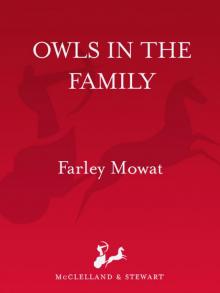 Owls in the Family
Owls in the Family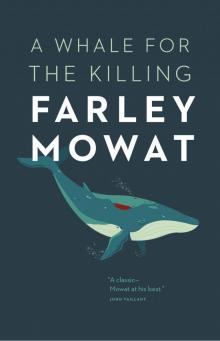 A Whale for the Killing
A Whale for the Killing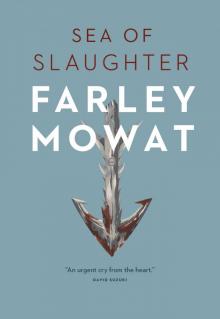 Sea of Slaughter
Sea of Slaughter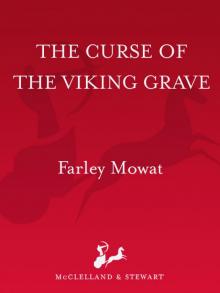 The Curse of the Viking Grave
The Curse of the Viking Grave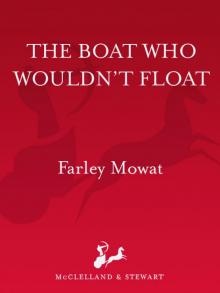 The Boat Who Wouldn't Float
The Boat Who Wouldn't Float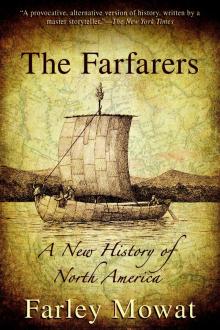 The Farfarers: Before the Norse
The Farfarers: Before the Norse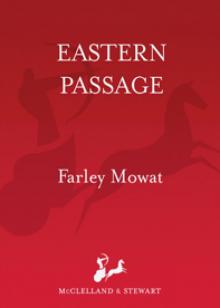 Memoir
Memoir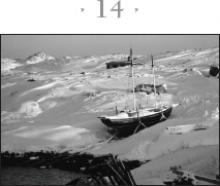 Bay of Spirits: A Love Story
Bay of Spirits: A Love Story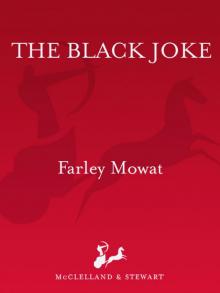 The Black Joke
The Black Joke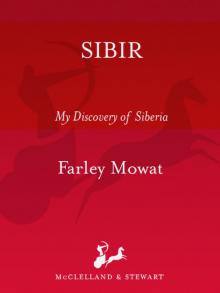 Sibir: My Discovery of Siberia
Sibir: My Discovery of Siberia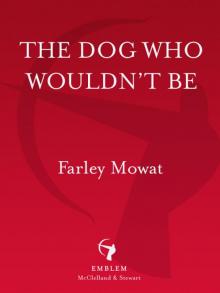 The Dog Who Wouldn't Be
The Dog Who Wouldn't Be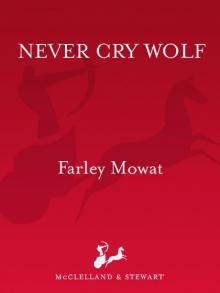 Never Cry Wolf
Never Cry Wolf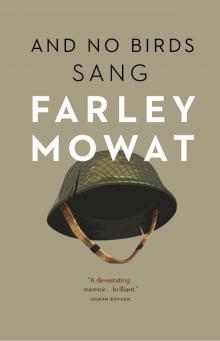 And No Birds Sang
And No Birds Sang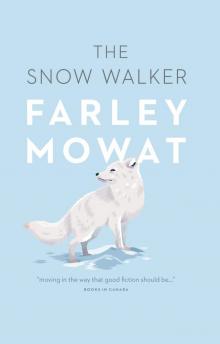 The Snow Walker
The Snow Walker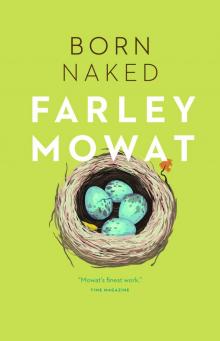 Born Naked: The Early Adventures of the Author of Never Cry Wolf
Born Naked: The Early Adventures of the Author of Never Cry Wolf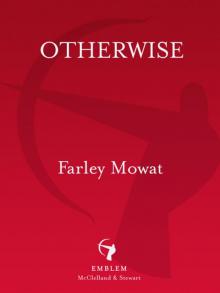 Otherwise
Otherwise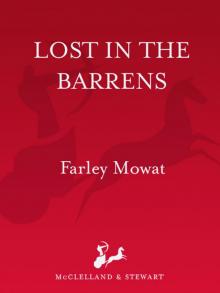 Lost in the Barrens
Lost in the Barrens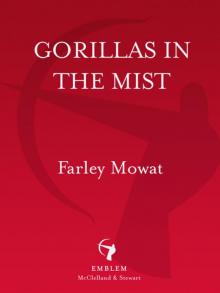 Gorillas in the Mist
Gorillas in the Mist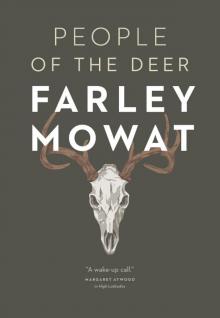 People of the Deer
People of the Deer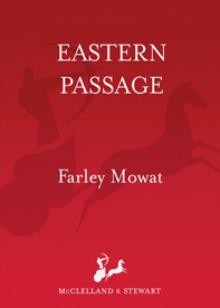 Eastern Passage
Eastern Passage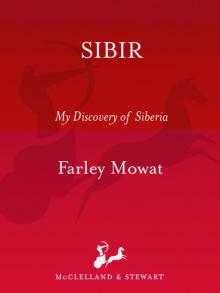 Sibir
Sibir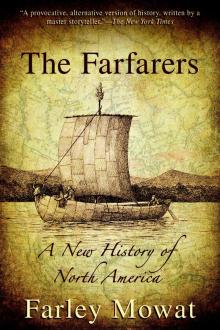 The Farfarers
The Farfarers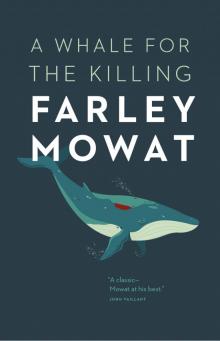 A Whale For The Killing (v5.0)
A Whale For The Killing (v5.0)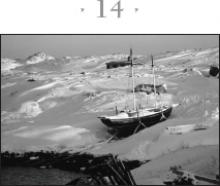 Bay of Spirits
Bay of Spirits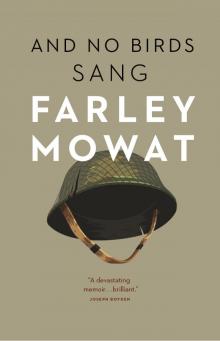 And No Birds Sang (v5.0)
And No Birds Sang (v5.0)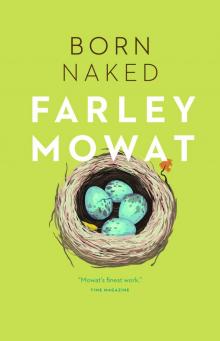 Born Naked
Born Naked